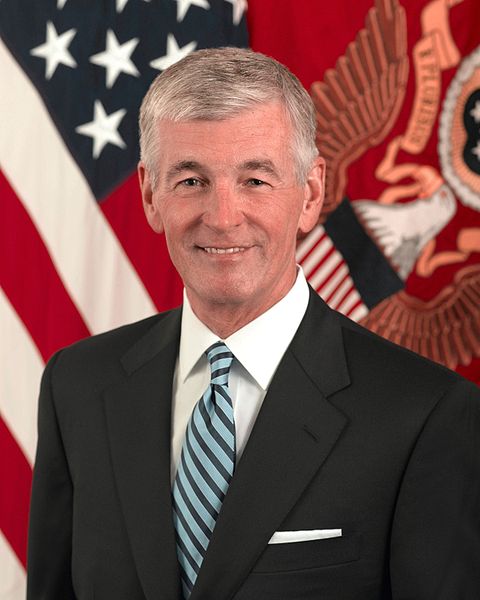Army Secretary Ignoring Don’t Ask, Don’t Tell?
 When I saw the NYT headline “Secretary of the Army Says He Will Not Pursue ‘Don’t Ask, Don’t Tell’ Discharges,” I was a bit shocked. While there’s always discretion in which policies one emphasizes, it’s unusual, indeed, for a senior official to blatantly announce that they’re going to ignore the law. It took me several paragraphs into Elisabeth Bumiller’s story to realize that John McHugh was instead saying something much more narrow.
When I saw the NYT headline “Secretary of the Army Says He Will Not Pursue ‘Don’t Ask, Don’t Tell’ Discharges,” I was a bit shocked. While there’s always discretion in which policies one emphasizes, it’s unusual, indeed, for a senior official to blatantly announce that they’re going to ignore the law. It took me several paragraphs into Elisabeth Bumiller’s story to realize that John McHugh was instead saying something much more narrow.
The secretary of the Army, John M. McHugh, said Wednesday that he was effectively ignoring the “don’t ask, don’t tell” law because he had no intention of pursuing discharges of active-duty service members who have recently told him that they are gay.
Mr. McHugh, the Army’s civilian leader and a former Republican congressman from upstate New York, said that he had initiated the conversations with service members in recent months as part of the Pentagon’s review of how best to carry out a repeal of the “don’t ask, don’t tell” law, which requires that gay service members keep their sexual orientation secret or face discharge.
President Obama, Defense Secretary Robert M. Gates and Adm. Mike Mullen, the chairman of the Joint Chiefs of Staff, have all called on Congress to repeal the 17-year-old law and allow gay service members to serve openly.
Although Mr. Gates announced revised standards last week that make it harder for the military to discharge service members whose sexual orientation is revealed by third parties, gay men and lesbians who willingly reveal their sexual orientation still face ouster from the military, at least as the law is written.
But Mr. McHugh, who spoke at a breakfast with Pentagon reporters, said it made no sense to pursue discharges of service members as he speaks with them about the change in policy. Mr. Obama, Mr. Gates and Admiral Mullen have all asked commanders to assess opinion within the military about the change in law. Mr. McHugh said it would be “counterproductive” to “take disciplinary action against someone who spoke with me openly and honestly.” He said the Pentagon was still trying to devise a way to more formally poll large numbers of service members about their views on changing the law.
So, in effect, McHugh is granting retroactive immunity to a specific group of soldiers who told him personally that they were gay as part of his inquiry into the policy. Given that it would indeed be not only “counterproductive” but borderline entrapment — not to mention, simply cruel — to punish people for engaging in an honest dialogue in cooperating with an official investigation, this is of course the correct policy.
As to the larger issue of enforcement, it makes sense for senior officials to use more discretion in how they pursue investigations until the inquiry is complete and a decision is made on the large policy. Ignoring the law entirely, however, would be malfeasance of office.
Meanwhile, as with Bill Clinton, President Obama is finding that going slow and taking half measures with this issue wins him no friends. Pam Spaulding exclaims, “Gee, Mr. President — here’s one branch on board; what’s with the lack of spine to pursue the legislative end to DADT?” And Gay Patriot‘s B. Daniel Blatt, noting that McHugh and Bush holdover Robert Gates are leading the way on this, quips, “Seems if Obama wants to get something done, he turns to a Republican.”
via Memeorandum
The media pull this misleading headline crap all the time. IMO it lowers the reporter’s credibility and the reporter probably isn’t writing the grabber.
Well this sounds like a smart move, as far as fact gathering-kind of cruel to ask a homosexual soldier his opinions and feelings and then turn around and thank him/her for his/her honesty by kicking them out.
That said, I am not sure why there needs to be a “go slow” approach on this-but I may be missing something.
Go slow makes sense as it is a significant change. I also think it makes sense to have it pushed by people other than than the C-in C. The further down the ladder it appears to come from, the better. This is really a cultural change, so if it is perceived as being forced from above, it will be less well accepted.
Steve
My question is: when did Tommy Tuberville become Sec of the Army? I thought he got the Texas Tech job.